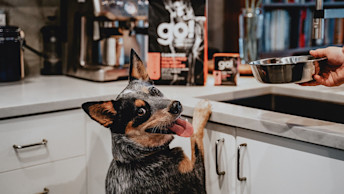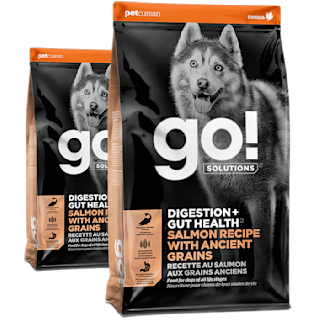August 13, 2021
Why Prebiotics and Probiotics Are Good for Your Dog

More and more products with prebiotics, probiotics and digestive enzymes are popping up on grocery store shelves. Have you ever wondered what exactly "biotics" are and why they are so popular? Are you curious about whether or not your dog needs them? In this article, we'll tell you everything you need to know about prebiotics, probiotics and digestive enzymes in your dog's food.
What are probiotics?
Probiotics are the good microorganisms (bacteria) living in your dog's digestive tract. When provided in adequate amounts, probiotics can help support a healthy gastrointestinal (GI) tract. Stress, antibiotics and poor diet can easily upset the balance of the microorganisms in the GI tract, leading to illness in your dog
Therefore, choosing a premium-quality food such as our Go! Solutions Digestion + Gut Health recipes that contain probiotics and are a great way to support your dog's GI health.

Recommended Solution
Ancient-grain solutions to support healthy digestion
A healthy digestive system is essential to your dog's overall wellbeing. Go! Solutions Digestion + Gut Health includes a distinctive mix of fibre-rich ancient grains, a three-yeast blend, and stable probiotics to help maintain a healthy gut and happy dog.
View Product Details
What are prebiotics?
Prebiotics are components in food that remain undigested until they reach the large intestine, where they act as food sources for good bacteria (i.e. probiotics) that live there. The most common examples of prebiotics in dog food are inulin from chicory root, oligofructose, and fructooligosaccharides (FOS). Studies have shown that dog food containing prebiotics have higher levels of beneficial bacteria in their stool, particularly Bifidobacteria and Lactobacilli.1 Prebiotics have also been shown to improve regularity and stool quality.
What are digestive enzymes?
Digestive enzymes are biologically active proteins that help break down and digest nutrients. Because of similarities in how probiotics and digestive enzymes are named on a bag of dog food, they can sometimes be confused. However, it's essential to realize that not only are probiotics and digestive enzymes different in structure, they also have very other functions in terms of supporting GI health.
A big difference between probiotics and digestive enzymes is that probiotics are living organisms (good bacteria), whereas digestive enzymes are non-living proteins.
While probiotics support GI and immune health by supporting an optimal balance of good bacteria in the gut, digestive enzymes work to digest food by targeting and breaking down specific nutrients into their absorbable components. For example, lipase – a lipid targeting enzyme – will break down fats into their fatty acid components, while protease – a protein targeting enzyme – will break down proteins into amino acids. Studies have shown that digestive enzymes aid in healthy digestion and improve stool quality in pets.2
The protease enzymes found in Go! Solutions Carnivore recipes are Bacillus subtilis and Aspergillus oryzae.
What is the microbiome and what affects it?
The microbiome is the community of microorganisms that inhabit a human or dog's body. In humans, it has been reported that there are more than ten times as many microbial cells as human cells!
Diet, antibiotics and illness can disturb the composition of the microbiome. When this happens, digestive disorders may appear, such as gas, bloating, indigestion, diarrhea, constipation, and irritable bowel syndrome. Fortunately, the microbiome is quite resilient and can restore itself when disturbed, though this could take several months or even years. Ingredients such as prebiotics and probiotics in your dog's food are a great way to support the bacterial composition of the microbiome.
Will feeding probiotics help my dog with allergies?
Although it's believed that there is an association between the gut microbiome and allergies, we know that more research is needed. Most of the research in this area has been performed on humans, not dogs.
The World Allergy Organization has provided guidelines that recommend using probiotics in pregnant and breastfeeding women and at high risk for having an allergic child and high-risk infants. Therefore, it's possible that probiotics could also play a role in allergy prevention in dogs, but much more research is needed.3
To read more about feeding dogs with allergies and sensitivities, check out our article Dog Food Allergy Symptoms and Adverse Food Reactions.
Gibson, G.R. and M.B. Roberfroid, eds. Handbook of Prebiotics. 2008.
Twomey, L.N., et al. Anim. Feed Sci, Technol., 2003. 108(1): 71-82.
Fiocchi, A., et al. World Allergy Organ J., 2015. 8(1).
Authors



